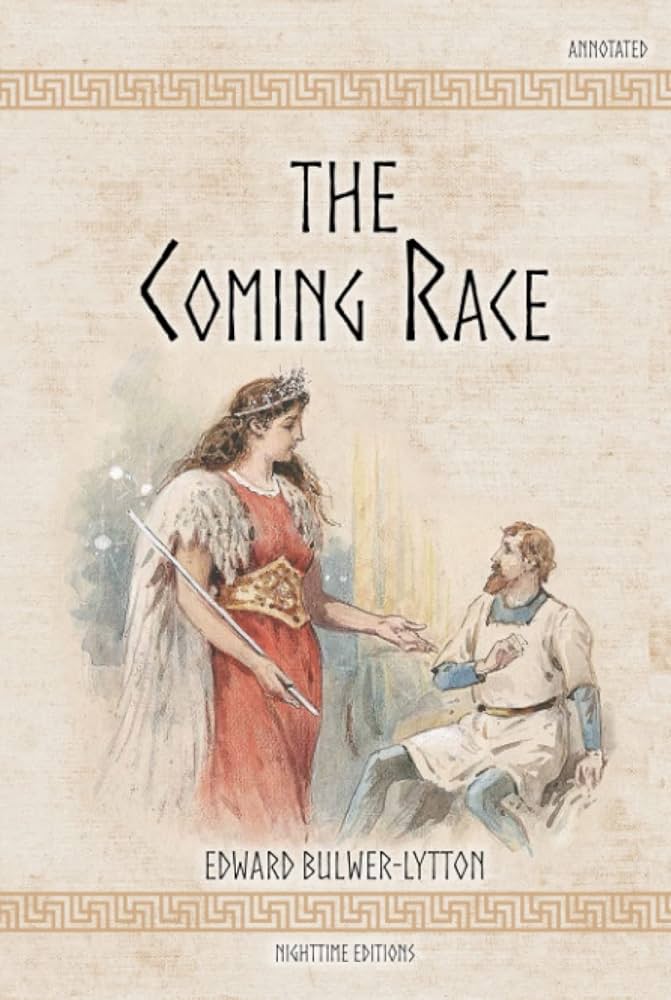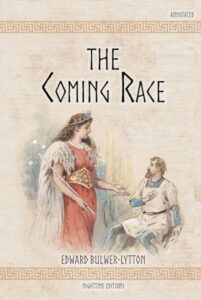Chapter XX — The coming Race
byChapter XX marks a shift in tone as Taee’s visits to me became more frequent and more personal. His youthful nature, brightened by wit and genuine interest, stood in contrast to the more formal and cerebral demeanor of his elders. Though only around twelve in their years, his mind worked with astonishing precision. But unlike others of his race, he seemed to enjoy the novelty I presented. To him, I was a curiosity wrapped in humor—a living relic of a world so unlike his own. His kindness didn’t feel superior, just deeply amused. That amusement gave me brief comfort, even as the reality of my difference weighed heavily.
Flight among the Vril-ya was not simply a mechanical task but a seamless blend of machine and mind. Their wings—constructed from massive plumes of a native bird and linked through sophisticated channels—were majestic in form and effortless in function. When used, they carried their wearer with elegance and minimal motion. Watching them ascend in silence felt like witnessing a dream. Naturally, I wanted to try. I was no stranger to physical effort, having been a capable swimmer and climber back home. But once harnessed to the wings, I discovered quickly that brute strength offered no advantage. My body remained bound to the earth, awkward in its effort and pitiful in execution.
The wings responded not just to movement, but to will. And therein lay the flaw. My attempts, though earnest, ended in repeated failure—painful crashes, missed glides, and mounting frustration. Zee had watched these sessions quietly, only stepping in after a particularly jarring fall left me dazed and bruised. With characteristic calm, she explained what I had started to suspect. My failures weren’t mechanical, nor were they due to poor instruction. I lacked the inner link, the volitional harmony, that made flight possible for them. Vril wasn’t just a tool—it was part of their biology.
Her words struck harder than the fall. She said I suffered from an “organic defect”—not a flaw of the mind, but of being. For the Vril-ya, their power was not taught but inherited, shaped by centuries of conscious development. They didn’t learn vril; they became it. I, an outsider, could never master something so fundamentally woven into their essence. The revelation wasn’t cruelly delivered, but it still stung. I had hoped for parity, if not in power, then at least in progress. Now, I saw the limits of both.
Zee’s concern grew more visible after this. Her voice, once clinical, had softened. Her hand, once guiding for instruction, now steadied me in care. There was a shift—subtle but unmistakable. What had begun as observation had become protection. She was no longer watching to see what I could do. She was watching to make sure I didn’t hurt myself trying. Her decision to end my flight trials came not from frustration, but affection. She had grown invested—not in results, but in me.
Taee, for his part, seemed unbothered by my limitations. If anything, my failures amused him more than my efforts. He teased me gently, but without cruelty. His presence reminded me that failure, while humbling, could also be humanizing. Among these near-perfect beings, perhaps my flaws made me more real. Their society valued control, balance, and silent mastery. I brought with me clumsiness, emotion, and unpredictability. And while it excluded me from their skillset, it gave me something they hadn’t expected—vulnerability.
Later, I reflected on what it meant to be unable to fly in a society where flight was as natural as walking. It wasn’t merely about motion. It was about identity. To fly was to belong, to integrate, to ascend in more ways than one. My grounded body, no matter how willing, was a constant reminder of separation. No matter how kind they were, I would always remain apart. Not unwanted, but unmatched. My spirit could admire, but never imitate.
The Vril-ya, though advanced, had cultivated a peace born from elimination of weakness. In my efforts, I carried all the weakness they had left behind—desire, frustration, fear, and the ache of trying. But in that ache, I also found something they perhaps no longer needed: hope. Hope that failure could still teach, still move, still matter. They had everything—yet their perfection seemed cold. I had nothing but attempts, and still, they warmed me.
Zee’s quiet care after the final failed flight told me everything. Though she said little, her actions spoke of connection. Her concern crossed the boundary of scientific interest and entered something more tender. It did not need to be declared. In her restraint, I saw devotion. And in her gaze, I sensed the painful truth: she saw value in me even when I could give nothing back. In that moment, I felt both honored and terribly alone.


